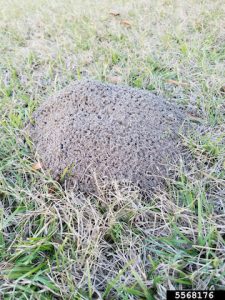Things That Just Do Not Work for Fire Ant Control
April 27, 2023By Bryan Smith, Clemson Extension Service
Sit around any table at a summer social gathering and the talk will eventually turn to fire ants. Everyone has their own idea about how to kill fire ants, including folk remedies and “common sense” ideas. Some of these remedies do kill some fire ants, but few of them have any real effect on the fire ant population in a yard. Many of them are illegal or even dangerous to attempt. A number of these are listed in this article, with the reasons why they are not effective or good ideas.
1. Grits will kill fire ants. The idea behind this control is that fire ants will eat the grit pieces, which will then swell inside their stomachs and cause them to explode. This is completely false. Fire ants do not eat solid food, but instead transport it to their larvae and place it on a larva’s “lip.” The larva spits digestive juices on the food, breaking it down into a liquid form. The liquid food is them distributed to the entire colony. Sprinkling grits around fire ant mounds actually provides food for them.
2. Boiling water kills the mound. Boiling water will kill almost any insect it touches, including fire ants. There are two problems with this method, though. The first one is our inability to pour boiling water throughout the entire mound, killing all the queens and eggs. We may kill some of them, but we will not kill the mound. We will also kill all plants and microorganisms in the soil. The second problem is one of personal safety. Handling and transporting several gallons of boiling water to each mound is dangerous and can require a quick trip to the emergency room.
3. Gasoline or kerosene will kill them. Gasoline and kerosene will kill insects. There are three problems with this method. First, we have the same problem that we do with boiling water – we generally can’t get gasoline or kerosene into the entire mound. Second, it is illegal to pour fuels and solvents onto the ground due to groundwater contamination. Intentionally pouring gasoline or other chemicals on the ground is a criminal act in South Carolina and can result in fines of up to $10,000.00 per day. Also, every fire ant mound has a tunnel leading down to groundwater, so any product applied to a mound – including fuel – has a small but open channel directly to groundwater. This also applies to various other chemicals, including brake cleaners, bleach, household cleaners, and so forth. Fire ant baits and insecticides are tested with this in mind to make sure the groundwater is safe when they are properly applied. And third, fuels and solvents are dangerous to handle in this fashion, especially gasoline. The results can be catastrophic if someone that is smoking walks down-wind of a gasoline-treated mound, or if someone flips a cigarette butt onto a mound recently treated with solvent or kerosene.
4. You can drown them if you pour enough water on them. This is true, but the problem is once again making sure that the water saturates or floods the entire mound for a long enough time period to suffocate the fire ants. Add to this fact that many of the fire ants may be “flushed” out of the mound alive and well and you can see why this method is ineffective. (Fire ants will actually “raft” together during a flood, floating to dry ground.)
5. Soapy water will kill them. The idea behind this treatment is that the soap will break down the waxy coating on their bodies, which retains water among other things. The ants will then be unable to retain water so they will dry out and die. Yes, soapy water can cause problems for fire ants, but we will not get it into all the nooks and crannies of the mound. We also have to be careful with groundwater contamination. Some of the cleaning agents found in various detergents may include phosphorus, which is a great nutrient for landscape plants when applied in proper amounts, but which also will cause prolific weed growth in ponds and lakes.
6. Granular laundry detergents will kill them. This assumes that the fire ants will eat the laundry detergent. The fire ant can smell approximately 5,000 times better than humans, so they will not be tempted to eat those aromatic (or even low-fragrance) detergents. Adding water takes us back to the soapy water method, with the same problems.
The best control for fire ants is a properly applied bait or insecticide. Many of these products are relatively inexpensive (baits generally cost $40 per acre per year to apply) to use in the home landscape. All of them are much more effective, when properly applied, than the methods mentioned above and much safer. Be safe – follow label directions of your chosen product and use it only where specified by the label.
More fire ant information is available on the Clemson Home and Garden Information Center:
Home Lawn Fire Ant Control
https://hgic.clemson.edu/factsheet/fire-ant-management-in-the-home-lawn/
Home Garden Fire Ant Control
https://hgic.clemson.edu/factsheet/controlling-fire-ants-in-the-vegetable-garden/
The Clemson University Cooperative Extension Service offers its programs to people of all ages, regardless of race, color, gender, religion, national origin, disability, political beliefs, sexual orientation, gender identity, marital or family status and is an equal opportunity employer.















